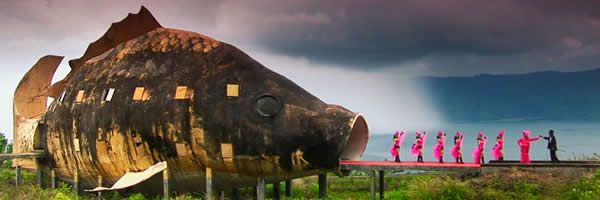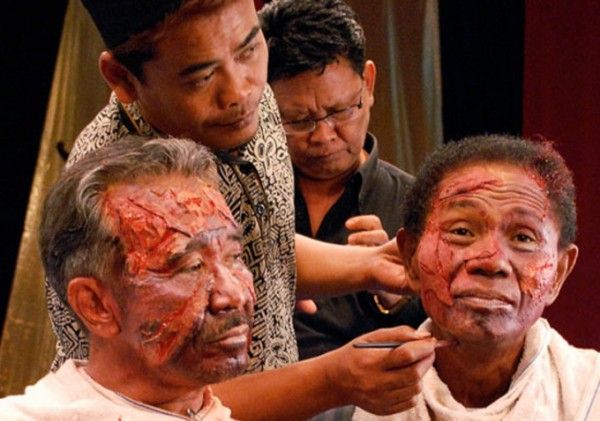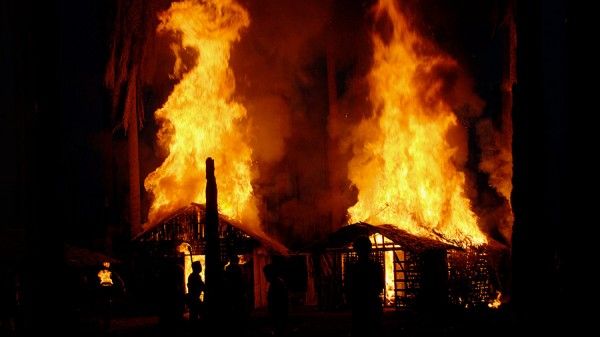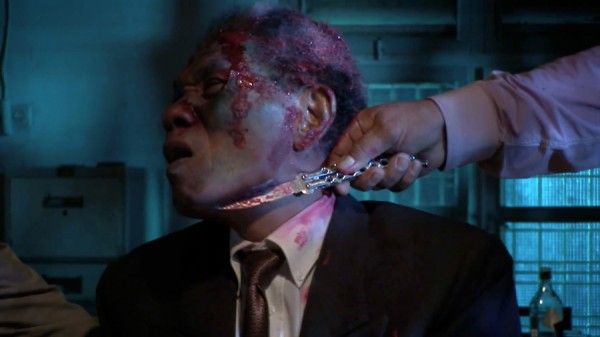History is written by the winners, and in Indonesia in 1965, the winners were killers. In Joshua Oppenheimer's shocking and thought-provoking documentary The Act of Killing, we bear witness to a nation transformed by its past into a sick, twisted culture that seems like an alternate reality created by a science-fiction writer. It's a horrifying "What if?" where killers are revered as celebrities, smile about their mass executions, and barely wrestle with any question of remorse. The Act of Killing brilliantly uses the power of media to ask if a monster was created by violent entertainment, can then he be aware of his monstrosities through the same medium? Smashing together perception and reflection, Oppenheimer has created a mind-bending picture that's deeply disturbing, darkly comic, and endlessly fascinating.
The film features a wide range of former executioners, but The Act of Killing focuses primarily on Anwar Congo and his buffoonish but equally murderous friend Herman Koto. In Indonesia in 1965-66, Congo, Koto, and their contemporaries were freely allowed to kill anyone accused of being a "communist" even though this label basically fell on anyone the state felt was an undesirable such as political enemies, intellectuals, ethnic Chinese, and any other groups or individuals. Because Congo and Koto are proud of their crimes, Oppenheimer asks if they'll direct recreations of their atrocities. Congo and Koto happily agree, and we're led through a culture that seems absolutely surreal. Along the way, we meet a newspaper publisher who happily lied and sent innocent people to their death, a celebrated paramilitary organization that wiped out thousands of Chinese citizens, and no one bats an eye at a culture that celebrates these acts.
Opperheimer's unique approach of having the murderers relate and recreate their stories allows the director to try to uncover the mind-boggling social conditions that would construct this kind of environment. On the surface, when Congo and his cohorts are bragging about their crimes, we can only remark, "Of course. How else would we expect a psychopath to act?" But to write them off as psychopaths is too easy because there's a larger social and historical context at work. Almost everyone we meet, whether they're a former executioner or not, accepts the massacres as completely ordinary. They talk about the killings as if it were as natural and commonplace as building bridges.
In one of the film's most shocking scenes, Congo and some members of the paramilitary organization Pancaslia Youth (which played a large role in the 1965-66 killings) are on a talk show speaking about the movie Oppenheimer has asked them to direct. The host happily asks Congo a question along the lines of, "How did you manage to humanely and efficiently exterminate the communists?" Later, when asked about why no one has ever tried to avenge the dead or speak out against the executioners, one of the other guests cheerfully responds that the people know any dissension would be met with fatal retribution. Seeing this interview, it feels like we're watching a dystopian future rather than a present that exists on our planet.
While Oppenheimer does pull back to see the larger context of the killers' movie, The Act of Killing never loses sight of Congo and Koto. Koto is a bit of a buffoon, and we always feel uncomfortable laughing at his antics. He's the one who has to cross-dress in the movie, and his attempts to run for political office fail because even though he's well-known, he doesn't have enough money to bribe the voters ("They're paid to show up at rallies. It's like any other job," Koto remarks). But every laugh at Koto's expense or anything else in the film comes with a pang of discomfort. We should be constantly horrified and disgusted with the people we're seeing, and while Oppenheimer has no sympathy for these monsters, he knows that to dismiss them as "monsters" would make us lose sight of the unsettling place humanity can go when it's encouraged to slaughter others without any fear of repercussion.
The most human aspect comes from examining Congo, but weaving his personal journey in with an exploration of how Western media influenced the mindset of the executioners. Throughout the movie, various figures constantly celebrate the "gangster", saying it translates into "free man" (etymologically it doesn't, but that's what they believe it means). It's a disturbing notion of "freedom", but one that is embodied by the American gangster movies these men watched. That's not to say that these men became murderers because they were inspired by gangster films. Instead, gangster films changed the way these men perceived themselves. Their sadism was no longer part of their true identity, but part of an identity they copied, which created a disassociation that created a barrier against feeling remorse.
Oppenheimer's experiment forces Congo back through the looking glass. Congo took on a fictional identity to create a horrific reality. Oppenheimer then encourages Congo, who now has difficulty sleeping, to create dramatic recreations of his actions. At first, Congo takes pride in his work as he goes back to one of the locations of his many executions and demonstrates the way he would strangle his victims with wire. His murderous comrades perceive Oppenheimer's experiment as a game, and we see them encourage villagers to emulate the screams and cries of past victims. It's an occasion to reminisce. But then Congo decides to play-act as one of the victims, and everything changes. He is beyond forgiveness, but not beyond reflection.
The movie opens with Voltaire's quote, "all murderers are punished unless they kill in large numbers and to the sound of trumpets." The murderers in the film have been killing to the sound of trumpets for so long that they act of killing has lost all negative connotation to not only them, but to most of the country. Life is not cheap and meaningless as much as it is redefined to the point where its theft can be completely acceptable. A reckoning has never come and will never come. To the executioners in The Act of Killing, the act of killing has become trivial, and the act of reflection has become lost to all but a few inside this reality. To outsiders, we can only watch in abject horror at a mad world ruled by madmen. Most of them hear the trumpets as a celebration; only one comes to realize it's a requiem.
Rating: A
Click here for all of our SXSW 2013 coverage. Click on the links below for my other reviews:




